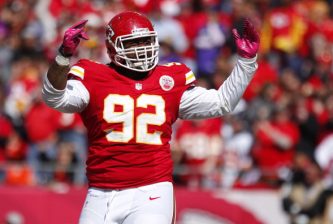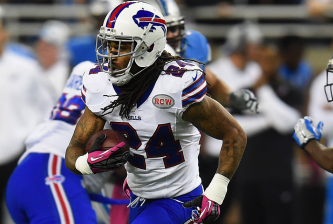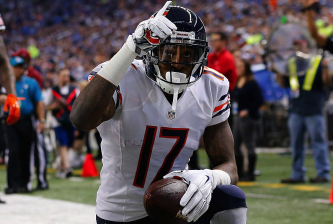When the Josh Gordon decision was finally, mercifully announced earlier this afternoon after his appeal, it was the same decision we’ve expected since early May. He’s gone for the season due to repeated violations of the league’s substance abuse policy.
He’s gone even though his lawyers claimed it was second-hand marijuana smoke this time. That angle may have been given a more lenient ear had this not been Gordon’s third violation, the second of which resulted in a two-game suspension to begin last season.
He’s gone even though the league’s position on marijuana use is comically outdated. The firm stance society once had against the drug has softened, so much that it’s now fully decriminalized in two states, and available for medical use in 21 others, and Canada. That’s called progression, something the NFL is willfully ignoring, which will change when the next drug policy is completed through collective bargaining.
He’s gone even though marijuana isn’t a performance-enhancing drug, and if anything is performance limiting. Clearly the NFL (or generally, any self-respecting company) doesn’t want a bunch of nacho-chomping potheads running around. That’s not a good look, but when your strong stance on the matter leads to a limit drastically higher than the regulations used by the International Olympic Committee, little common sense remains. The NFL has a limit of 15 nanograms per milliliter in a urine sample. The IOC? They jacked it up to 150 grams in May of 2013.
He’s gone even though he passed over 70 drug tests, and narrowly exceeded that aggressive limit during one. The Olympic threshold was pushed way up prior to the Sochi games to not only reflect a culture change, but also to ensure that only “pretty dedicated cannabis users” were punished. Limited recreational use or second-hand smoke isn’t the intended target.
None of that matters, you say, because Gordon was fully aware of the rules, however strict and absurdly out of touch they may be, and he repeatedly violated them. You’re right, though that shouldn’t stop this from being a case study in everything that’s wrong with the NFL’s current drug approach, and why significant changes are needed. Thankfully, they’re coming, with modifications to the marijuana threshold discussed as part of a new policy that’s been in negotiation since 2011. Whenever changes are implemented, it’ll be too late for Gordon.
Immediately upon confirmation that Gordon’s suspension would be upheld, there were Ray Rice comparisons. Gordon gets over a year for smoking a bit of weed, and Rice gets two games for punching out his wife (but he’s sorry!). Optically, that looks horrible, though the comparison is irrelevant. As far as the NFL is concerned, the two behaviors fall under entirely separate policies. Gordon’s mistake can be measured, and while his actions were disgusting and inexcusable, there’s far more grey than black and white legally with Rice.
What’s most troubling, though, isn’t even the league’s outdated policy. It’s how much the NFL doesn’t seem to care about a young man who clearly needs guidance.
He can get it elsewhere, sure, but Gordon would find the best grounding while around the locker room during his year off, and in the company of his teammates and coaches. The Browns pushed for him to have access to the team even if he was barred from game and practice participation. He’s certainly made poor decisions lately, and was charged with a DWI just last month. He needs a constant authoritative voice, or several.
He’s also still only 23 years old, and with the right direction he can mature. Too bad he’ll be denied that guidance, as during his suspension Gordon won’t be permitted in team facilities.
Not an ideal condition to place on someone with a substance abuse problem. By imposing that restriction, the NFL is telling Gordon he’s on his own, and the league cares little about providing structure, something which seems inherent in the concept of a team.
If he can keep it together, a pass catcher with more receiving yards than anyone not named Jerry Rice or Randy Moss over his first two seasons will be allowed back in 2015, once he’s reinstated by the league. He’ll be on our living room picture boxes at the still-ripe age of 24.
Until then, the Browns are left with Miles Austin and Andrew Hawkins as their top two receivers. Get ready for the Johnny Manziel show by Week 5.




